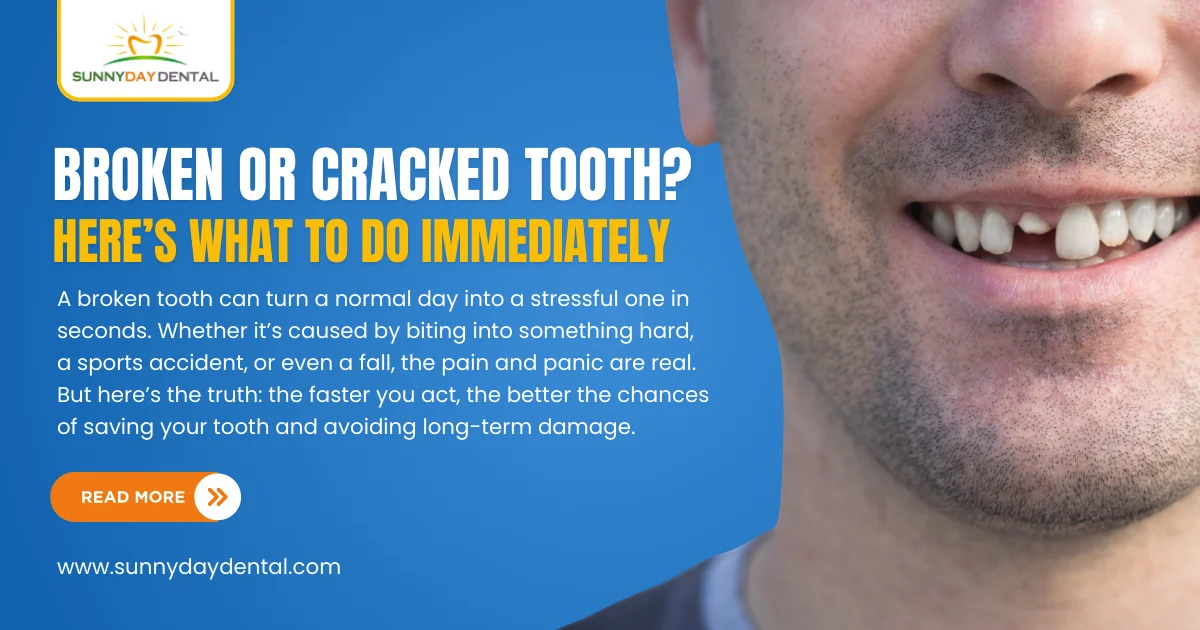A broken tooth can turn a normal day into a stressful one in seconds. Whether it’s caused by biting into something hard, a sports accident, or even a fall, the pain and panic are real. But here’s the truth: the faster you act, the better the chances of saving your tooth and avoiding long-term damage. In this guide, we’ll walk you through the exact steps to take right away, when to call an emergency dentist in Woodbridge, and the treatment options that can restore your smile.
Table of Contents
ToggleFirst Aid For A Broken Or Cracked Tooth

The first few minutes after breaking or cracking a tooth matter more than most people realize. Quick and careful action can minimize pain and protect your tooth until you reach a dentist.
Start by rinsing gently with warm water to clear away debris. If there’s bleeding, apply clean gauze for 10–15 minutes. Use a cold compress outside your cheek to reduce swelling. If you find a broken piece, place it in milk or saline. Sometimes, dentists can reattach it. Cover any sharp edges with dental wax or sugar-free gum to protect your cheeks and tongue, and take over-the-counter pain relief if needed.
The key is to stabilize the situation without making things worse. Avoid hot or cold drinks, chewing on the injured side, or using household glues. Once you’ve taken these steps, the next question is: how urgent is it? That’s where the difference between a minor chip and a true tooth fracture treatment becomes clear.
When is it a Dental Emergency?
Not every chipped tooth requires an emergency visit, but some signs tell you it’s time to call a dentist in Woodbridge immediately.
Seek help without delay if you have severe pain, visible cracks reaching the gum, a tooth that feels loose, or bleeding that doesn’t stop. Facial swelling, sensitivity to hot or cold, or a pinkish center showing are also red flags. These signs often mean the tooth’s nerve or pulp is involved, and waiting can lead to infection or even tooth loss.
If you’re uncertain, remember this: teeth don’t heal themselves. When in doubt, treat it as an emergency. Once you arrive at Sunny Day Dental, here’s what you can expect from an emergency dentist in Woodbridge.
What to Expect at Sunny Day Dental
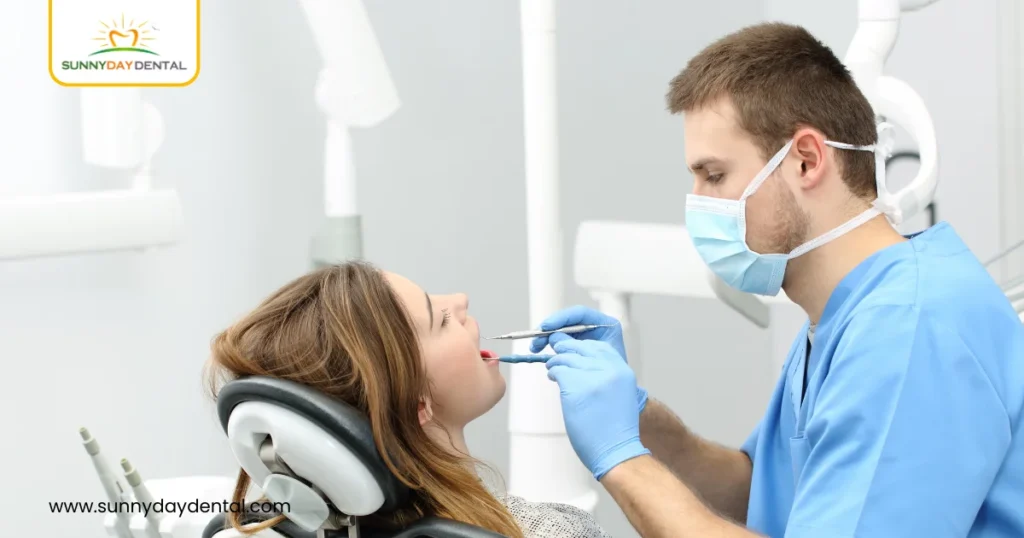
Walking into the dental chair with a broken tooth can be overwhelming, but the right team will guide you step by step. At Sunny Day Dental, your comfort and clarity are top priorities.
First, immediate pain relief is provided, whether numbing the area or smoothing sharp edges. Next, digital X-rays and an exam help pinpoint the exact damage, from surface cracks to deep fractures. Once the diagnosis is clear, you’ll be presented with a tailored treatment plan, including options that fit your needs.
Many chipped tooth repair cases are handled in a single visit, restoring function and appearance the same day. But the type of treatment depends on the extent of the damage. That brings us to your next concern: what options are on the table?
4 Treatment Options for a Broken Tooth
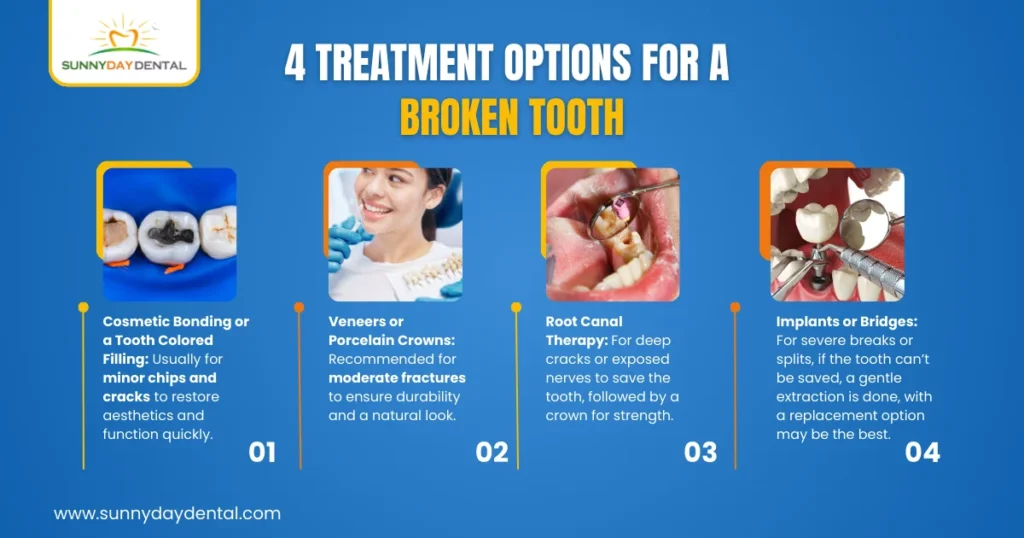
Not all fractures are created equal, which is why tooth fracture treatment varies so widely.
- Cosmetic Bonding or a Tooth Colored Filling: Usually for minor chips and cracks to restore aesthetics and function quickly.
- Veneers or Porcelain Crowns: Recommended for moderate fractures to ensure durability and a natural look.
- Root Canal Therapy: For deep cracks or exposed nerves to save the tooth, followed by a crown for strength.
- Implants or Bridges: For severe breaks or splits, if the tooth can’t be saved, a gentle extraction is done, with a replacement option may be the best.
The goal is always to preserve your natural tooth whenever possible. Still, every decision also considers long-term function and appearance. This is especially important when it comes to children, where timing is even more critical.
Pain, Sensitivity, And Swelling: What They Mean
When a tooth breaks, the type of discomfort you feel often reveals what’s happening beneath the surface.
Sharp pain when biting usually indicates a vertical crack. Lingering sensitivity to cold may point to nerve irritation. Facial swelling, bad taste, or pus suggest infection, which is an urgent situation that can spread if ignored. These signals shouldn’t be dismissed; they’re your body’s alarm bells.
Responding quickly ensures that what begins as a cracked tooth doesn’t escalate into a full-blown infection or tooth loss. Which brings us to the most important point: why timing matters.
Why Immediate Dental Care Matters
Some people try to “tough it out” or hope a broken tooth will somehow heal. Unfortunately, that’s never the case.
Cracks allow bacteria to enter, causing decay, infection, or abscesses. Exposed dentin increases sensitivity and speeds up wear. Delays often turn simple bonding into more invasive procedures like crowns or root canals. Acting fast not only saves your tooth but also prevents spiraling costs and complications.
Once your tooth is treated, the next step is protecting it, and your whole smile, going forward. That’s where preventive habits and regular visits to a dentist in Woodbridge come in.
Preventing Future Breaks And Cracks
After a repair, it’s natural to want to avoid a repeat incident. The good news is that a few precautions go a long way.
- Stick to soft foods right after treatment.
- Wear a nightguard if you grind your teeth.
- Use a sports mouthguard if you play contact sports.
- Maintain regular checkups and dental cleaning in Woodbridge every six months.
These small steps not only protect repaired teeth but also catch early cracks before they become emergencies. And if you’re currently dealing with a dental crisis, here’s the simplest next step.
Special Considerations for Children
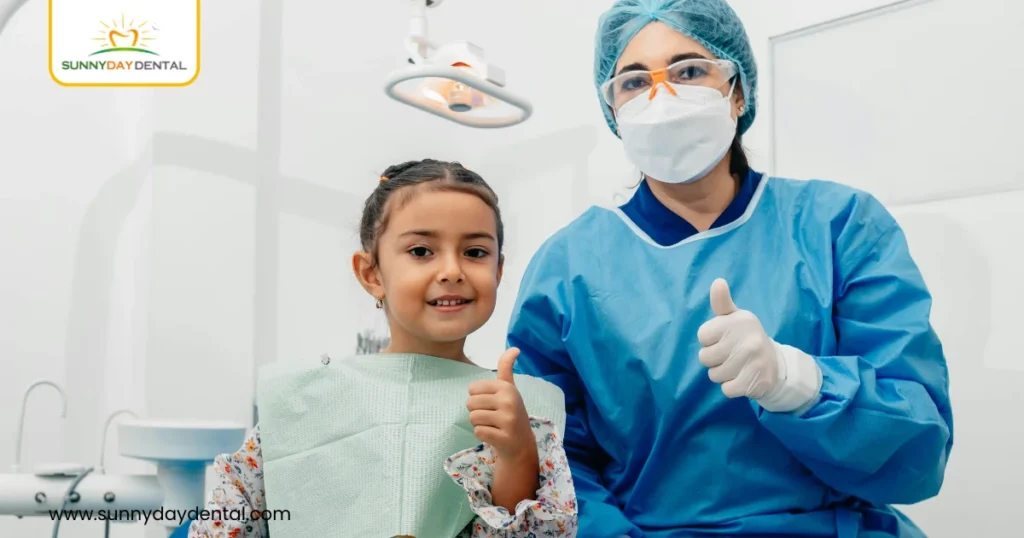
Kids are especially prone to dental accidents, from playground slips to sports injuries. But children’s teeth require a slightly different approach.
For baby teeth, smoothing or bonding may be enough to prevent discomfort and ensure normal chewing and speech. For permanent teeth, however, quick action is essential. If a permanent tooth breaks, bring any fragments immediately. If it’s completely knocked out, keep it moist in milk or saline and head to the clinic right away.
Sunny Day Dental’s Kids’ Dentistry in Woodbridge specializes in treating little ones with care and calm, ensuring their dental development stays on track. And beyond kids, both adults and children need to pay close attention to pain and sensitivity. It’s often the body’s way of warning you about a more serious cracked tooth problem.
Take Action Today
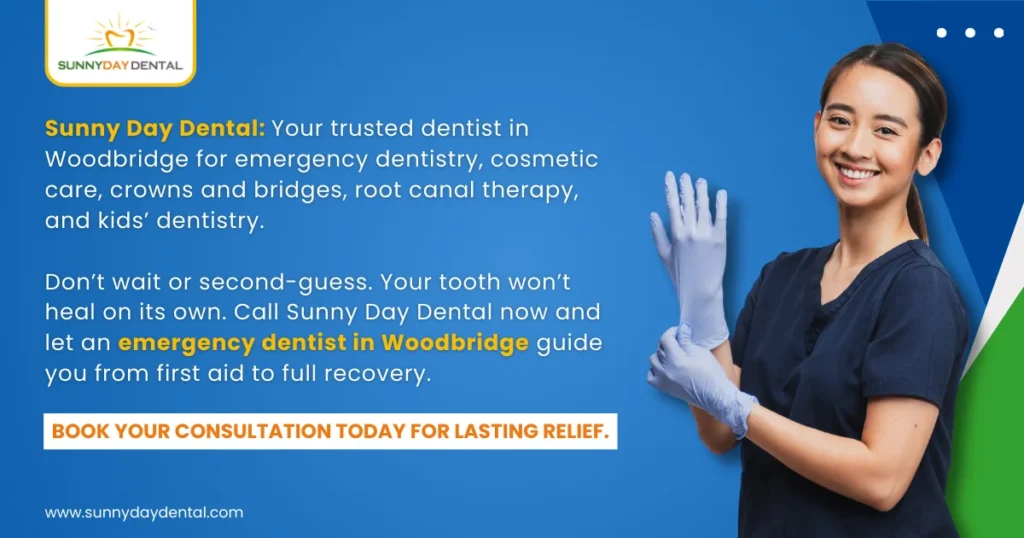
A broken tooth is painful, stressful, and time-sensitive. But with the right care, it’s absolutely fixable. Sunny Day Dental in Woodbridge is here with same-day emergency appointments, compassionate care, and proven treatments to get your smile back on track.
Sunny Day Dental: Your trusted dentist in Woodbridge for emergency dentistry, cosmetic care, crowns and bridges, root canal therapy, and kids’ dentistry.
Don’t wait or second-guess. Your tooth won’t heal on its own. Call Sunny Day Dental now and let an emergency dentist in Woodbridge guide you from first aid to full recovery.
FAQs for Broken or Cracked Tooth
1) What Should I Do Immediately If I Have A Broken Tooth?
If you have a broken tooth, rinse gently with warm water, apply clean gauze to stop bleeding, and use a cold compress on your cheek to reduce swelling. Save any fragments in milk or saline and bring them with you. Avoid very hot or cold drinks and do not chew on the injured side. Skip household glues. Call an emergency dentist in Woodbridge right away so you can be assessed for tooth fracture treatment. Fast action helps prevent infection and can mean the difference between simple bonding and more advanced care like a crown or root canal.
2) How Do I Know If A Cracked Tooth Is An Emergency Or Can Wait?
A cracked tooth is urgent if you have severe pain, a visible crack reaching the gumline, lingering sensitivity to heat or cold, facial swelling, or a loose tooth after trauma. These signs suggest deeper damage or nerve involvement. If you are unsure, call a dentist in Woodbridge and describe your symptoms. Teeth do not heal themselves; cracks can spread and invite bacteria. Early tooth fracture treatment usually means easier, less costly care such as chipped tooth repair or a crown rather than extraction or complex surgery.
3) What Are The Most Common Treatments For A Broken Tooth?
Treatment depends on the depth and location of the damage. Minor chips often need chipped tooth repair using bonding or a tooth-colored filling. Moderate fractures may call for a veneer or porcelain crown for long-term strength and aesthetics. If the crack reaches the pulp, root canal therapy is used to protect the tooth from infection, followed by a crown. In cases where the tooth is split and cannot be saved, replacement options like an implant or bridge are discussed. Your emergency dentist in Woodbridge will tailor tooth fracture treatment to your exact situation.
4) Can A Chipped Tooth Be Repaired In One Visit?
Many times, yes. For small to moderate chips, chipped tooth repair with composite bonding can often be completed in a single appointment. The dentist shapes and polishes a tooth-colored resin so it blends seamlessly with your smile and restores function quickly. More extensive fractures may require a custom crown or veneer, which can take additional visits. An experienced dentist in Woodbridge will advise whether same-day care is appropriate or if a staged plan will offer better strength and longevity for your broken tooth or cracked tooth.
5) Will I Always Need A Root Canal For A Cracked Tooth?
Not always. A cracked tooth needs a root canal only if the crack extends into the pulp or if there are signs of nerve inflammation or infection such as lingering pain, swelling, or a pimple-like bump on the gums. Superficial cracks and small chips can be managed with bonding, fillings, or crowns. Your emergency dentist in Woodbridge will use an exam and digital X-rays to determine whether tooth fracture treatment should include a root canal or a more conservative option. The goal is to save the tooth whenever possible.
6) How Can I Prevent Another Broken Tooth After Treatment?
Prevention starts with habits and routine care. Wear a sports mouthguard for contact or ball sports and consider a nightguard if you clench or grind. Avoid biting hard objects like ice or pens. Keep up with professional checkups and dental cleaning in Woodbridge every six months so hairline cracks and bite issues are caught early. Good home care and fluoride help strengthen enamel. Your dentist in Woodbridge can also evaluate your bite and recommend adjustments or protective restorations to reduce stress on vulnerable teeth after tooth fracture treatment.
7) Is It Safe To Wait A Few Days If The Pain From A Broken Tooth Subsides?
Pain that fades can be misleading. A broken tooth may feel better temporarily, but cracks can still allow bacteria to reach the dentin or pulp. Waiting increases the chances of infection, which can lead to swelling, abscess, and more complex care. Even if discomfort is minor, schedule an exam with an emergency dentist in Woodbridge promptly. Early chipped tooth repair or a protective crown often prevents future pain, preserves more natural tooth structure, and keeps treatment costs predictable.
8) What Should Parents Do If A Child Chips Or Breaks A Tooth?
Stay calm and follow first aid: rinse gently, apply gauze for bleeding, and use a cold compress for swelling. Save any fragments and call a dentist in Woodbridge who treats children. Baby teeth may be smoothed or bonded for comfort and function. For permanent teeth, fast tooth fracture treatment is crucial; if a tooth is knocked out, keep it moist in milk or saline and head to an emergency dentist in Woodbridge immediately. Early chipped tooth repair protects developing teeth and supports normal speech and chewing.

